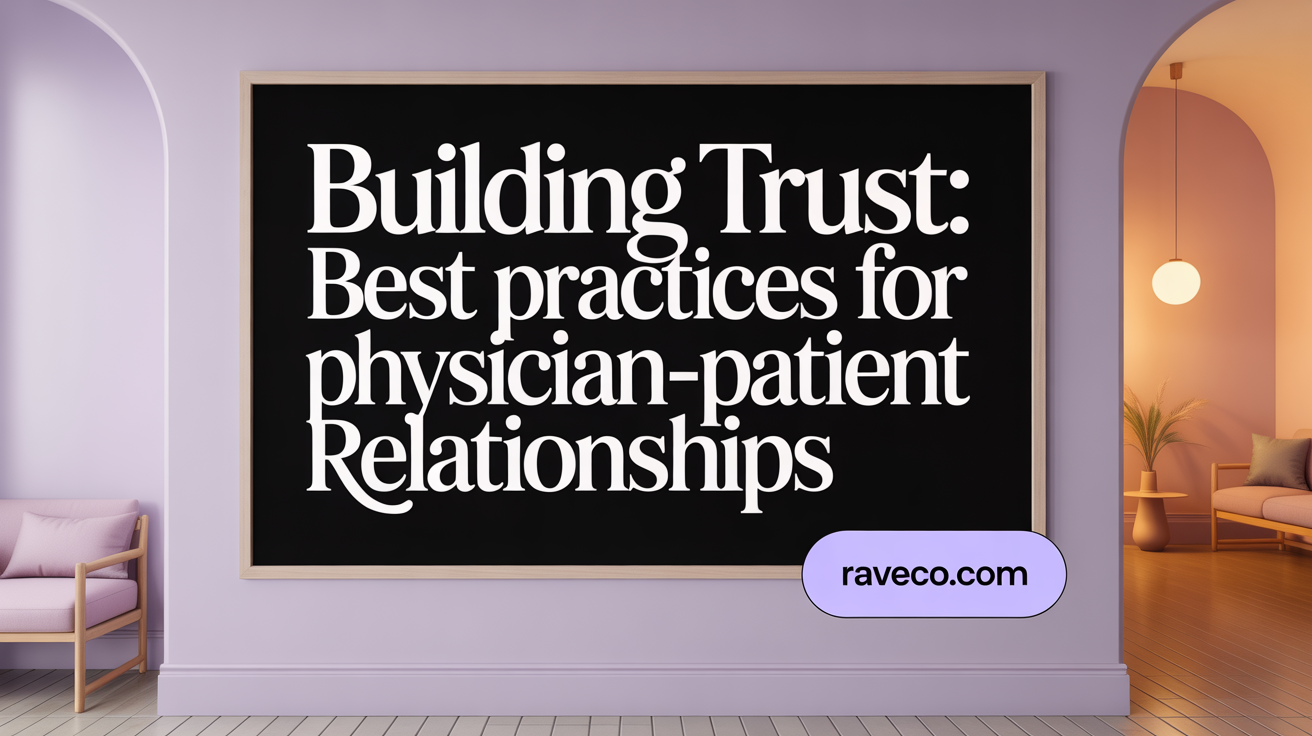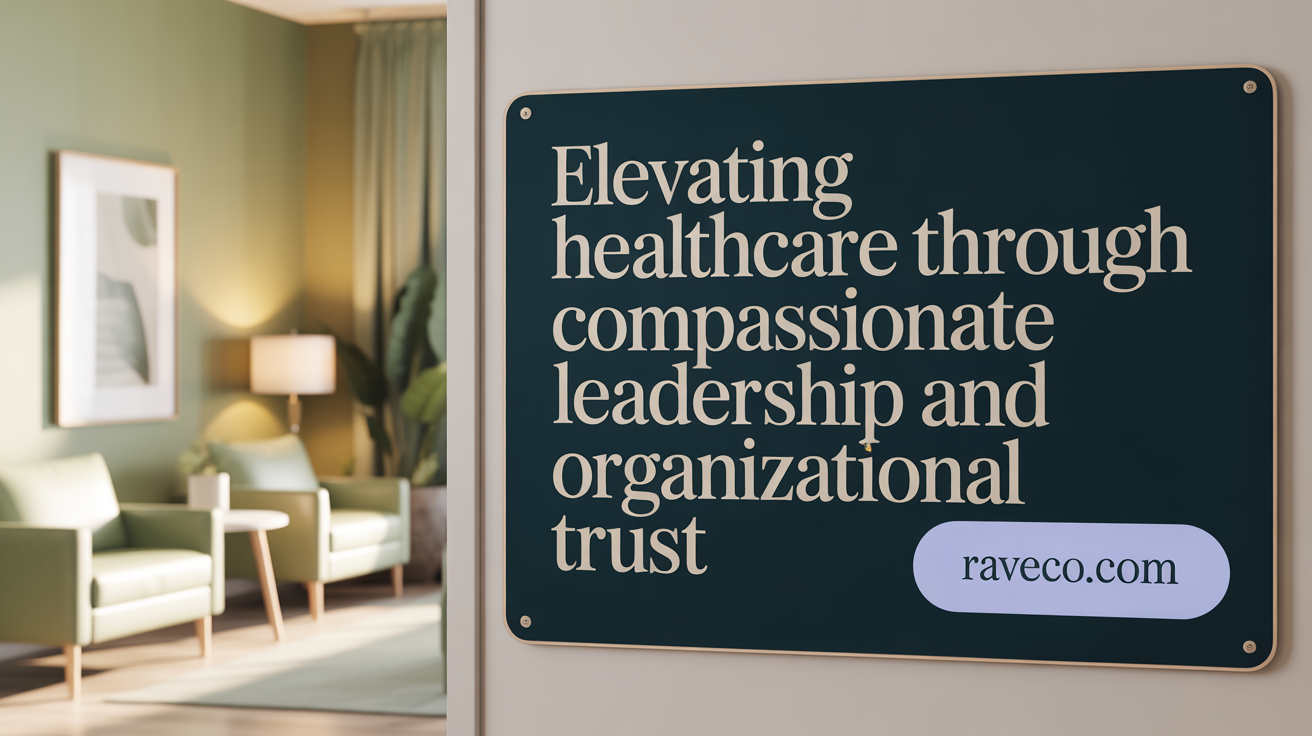Navigating Your Birth Control Choices: Tailoring Options to Fit Your Unique Lifestyle

Why Trust Matters in Healthcare
Trust is fundamental to effective healthcare delivery, forming the backbone of the physician-patient relationship. When patients trust their doctors, they are more likely to share vital health information, adhere to treatment regimens, and actively engage in their care. This foundation of trust nurtures open communication, empathy, and respect, resulting in better health outcomes and enhanced patient satisfaction. Our exploration delves into why delivering care with your own doctor is crucial for fostering this trust and how personalized, continuous care promotes confidence and collaboration in healthcare.
The Essential Role of Trust in Effective Healthcare Delivery

What is the importance of trust in the physician-patient relationship for effective healthcare delivery?
Trust serves as a cornerstone of successful healthcare interactions. When patients trust their physicians, they are more willing to openly share their symptoms, medical history, and concerns. This transparency leads to more accurate diagnoses and tailored treatment plans.
An atmosphere of trust also encourages patients to adhere to prescribed therapies and follow-ups, which can directly improve health outcomes. Patients who feel safe and respected are likely to participate actively in their own care, asking questions and expressing doubts without fear of judgment.
Building this level of trust requires demonstrating medical competence, displaying genuine care and empathy, and engaging in respectful, clear communication. When physicians listen attentively, respect patient autonomy, and provide honest information, patients develop a sense of confidence in their provider.
The impact of trust extends beyond individual experiences. It reduces anxiety, enhances satisfaction, and fosters positive perceptions of the healthcare system. Ultimately, trust not only improves individual health outcomes but also streamlines the delivery of care, leading to more efficient and effective healthcare overall.
Behaviors and Best Practices Physicians Use to Build and Maintain Trust
 Building and maintaining trust in the physician-patient relationship is foundational for effective healthcare. Physicians can adopt specific behaviors that foster a deeper connection and reassurance. One essential approach is establishing genuine rapport through sincere interest and consistent, clear communication. Active listening—paying close attention to patients' concerns and responding empathetically—helps patients feel valued and understood.
Building and maintaining trust in the physician-patient relationship is foundational for effective healthcare. Physicians can adopt specific behaviors that foster a deeper connection and reassurance. One essential approach is establishing genuine rapport through sincere interest and consistent, clear communication. Active listening—paying close attention to patients' concerns and responding empathetically—helps patients feel valued and understood.
Non-verbal cues such as appropriate eye contact, facial expressions, and body language can significantly strengthen trust. Introducing oneself by name, remembering personal details, and thoroughly explaining procedures or test results demonstrate respect and reliability. During examinations, gentle physical touch can reassure patients and convey care. Maintaining honesty about diagnoses, treatment options, and potential risks, while managing emotions to stay calm and confident, builds credibility.
Implementing strategies that prioritize transparency, confidentiality, and cultural sensitivity further reinforces trust. Physicians should involve patients in decisions about their care, respecting their values and preferences. This inclusive approach ensures patients feel empowered and respected.
On an organizational level, efforts to improve transparency—through clear communication and resource sharing—along with systemic practices such as reducing clinician workload, help sustain trust. Protecting patient privacy and practicing ethically by avoiding conflicts of interest are also vital.
In summary, adopting behaviors like empathetic engagement, honest communication, and attentiveness cultivates a trustworthy environment where patients are more likely to adhere to treatments, share important health information, and participate actively in their care.
Personalized, Continuous Care: The Foundation for Long-Term Trust

How does personalized, continuous care contribute to strengthening patient trust?
Personalized and ongoing care play a crucial role in building lasting trust between patients and healthcare providers. When providers take the time to understand each patient’s unique needs, preferences, and cultural background, patients feel seen and respected. This tailored approach fosters open, honest communication and helps create a relationship rooted in understanding.
Continuity of care—such as seeing the same provider over time or coordinating treatments across different specialties—helps patients perceive their care as seamless and dependable. This consistency encourages them to trust that their health concerns are being attentively managed and that their provider truly understands their health journey.
Involving patients actively in decisions about their treatment options further boosts trust. When patients are empowered to participate, they are more likely to feel confident in their care plans and to view the healthcare system as transparent and respectful.
The cumulative effect of these practices—personalization, ongoing engagement, and patient involvement—creates a supportive environment where trust is strengthened. This deepened trust often leads to better adherence to treatment, more open communication about health issues, and improved overall health outcomes.
Ultimately, personalized, continuous care transforms routine visits into meaningful, trusting relationships, laying a strong foundation for long-term health and collaboration.
Communication, Transparency, and Cultural Competence as Pillars of Trust
 Building trust in healthcare relies heavily on three interconnected factors: effective communication, transparency, and cultural competence. Each plays a vital role in fostering a strong, respectful bond between patients and providers.
Building trust in healthcare relies heavily on three interconnected factors: effective communication, transparency, and cultural competence. Each plays a vital role in fostering a strong, respectful bond between patients and providers.
Effective communication is the foundation of trust. Healthcare providers can improve their relationships with patients by listening actively, explaining medical information in simple terms, and showing genuine empathy. For example, making eye contact, sitting during the conversation, and encouraging questions demonstrate attentiveness and respect. When patients feel heard and understood, they are more likely to share important details about their health, which leads to better diagnoses and personalized care.
Transparency further enhances trust, especially during uncertain or sensitive situations. Being honest about diagnoses, treatment risks, and limitations—even admitting mistakes—builds a culture of openness. When providers clearly explain their reasoning and keep patients informed about their care, it reduces confusion and fears, strengthening confidence in the healthcare team.
Cultural competence is equally critical, particularly when serving diverse populations. Respecting patients' backgrounds, beliefs, and preferences allows providers to tailor communication and care plans effectively. This sensitivity helps reduce misunderstandings and perceived biases, fostering an environment where minority and marginalized groups feel valued and respected.
Strategies to improve these trust-building elements include:
- Regular training in cultural humility and communication skills.
- Utilizing interpreter services and culturally appropriate educational materials.
- Maintaining consistent, transparent messaging about treatment options and health information.
- Encouraging patient participation in decision-making, which empowers individuals and builds mutual respect.
In combination, effective communication, transparency, and cultural awareness create a collaborative atmosphere. This environment encourages patients to be open about their concerns and adherent to treatments, ultimately leading to better health outcomes and a stronger, trust-based relationship.
Understanding and implementing these pillars are essential for healthcare providers committed to high-quality, patient-centered care. As trust strengthens, patients become more engaged, satisfied, and willing to maintain long-term relationships with their healthcare providers.
Physician Leadership, Ethical Practices, and Organizational Trust
 The influence of physician leadership on patient trust cannot be overstated. When physicians exemplify integrity, transparency, and cultural competence, they foster an environment where patients feel valued and understood. Effective leadership within healthcare organizations promotes a culture of ethical practices and continuous professional development, which directly correlates with higher levels of trust. Leaders who prioritize open communication, honesty about medical errors, and equitable care create a foundation for stronger patient relationships.
The influence of physician leadership on patient trust cannot be overstated. When physicians exemplify integrity, transparency, and cultural competence, they foster an environment where patients feel valued and understood. Effective leadership within healthcare organizations promotes a culture of ethical practices and continuous professional development, which directly correlates with higher levels of trust. Leaders who prioritize open communication, honesty about medical errors, and equitable care create a foundation for stronger patient relationships.
The adherence to ethical standards is essential—this is exemplified by the 'golden rule' in medical ethics. It states, 'Whatsoever ye would that men should do to you, do ye even so to them.' This principle encourages physicians to treat patients with the same respect and compassion they would desire for themselves. Applying this rule reinforces empathetic and ethical conduct, fostering a caring and trustworthy physician-patient relationship.
Organizational efforts play a crucial role in building systemic trust. Initiatives such as enhancing accessibility to clinical notes, utilizing telehealth for follow-up care, and addressing social determinants of health demonstrate a commitment to transparency and patient engagement. These strategies help dispel misinformation, promote shared decision-making, and show respect for patient autonomy.
Physicians' well-being and ongoing professional growth are also vital. When clinicians are supported through respectful work environments and opportunities for development, they are better equipped to provide compassionate, competent care. This, in turn, cultivates patient confidence and enhances overall trust.
In summary, physician leadership combined with steadfast adherence to ethical practices creates a ripple effect that rebuilds and sustains trust at both the individual and organizational levels. Trust enables better health outcomes, greater patient engagement, and a more resilient healthcare system.
Trust’s Role in Improving Healthcare Outcomes and Patient Engagement
How does trust benefit healthcare outcomes, preventive care, and patient engagement?
Trust is a fundamental element that significantly influences various aspects of healthcare. When patients trust their physicians and the healthcare system, they are more inclined to follow treatment regimens, participate in preventive measures, and engage actively in their own health decisions.
This confidence encourages open and honest communication, which can lead to more accurate diagnoses and effective treatment planning. Patients who trust their providers are more likely to seek help early, adhere to prescribed therapies, and adopt healthier behaviors, all of which contribute to better health outcomes.
Furthermore, trust enhances patient satisfaction and emotional well-being. When patients feel valued and understood, they are more willing to ask questions, share concerns, and participate in shared decision-making. This active involvement fosters a collaborative relationship, reinforcing positive health behaviors and improving management of chronic conditions.
Building trust also reduces unnecessary healthcare costs by decreasing hospital readmissions, avoiding redundant testing, and preventing complications caused by non-adherence. Overall, trust acts as a cornerstone for effective communication and cooperation, leading to healthier populations, increased patient loyalty, and the success of healthcare organizations.
| Aspect | Impact of Trust | How It Enhances Outcomes |
|---|---|---|
| Treatment adherence | Increased patient compliance | Ensures medications and therapy are properly followed |
| Preventive care participation | Higher engagement in screenings and vaccinations | Leads to early disease detection and prevention |
| Patient satisfaction | Improved emotional experience and trust in care | Promotes continued use of health services |
| Healthcare costs | Reduction in hospitalization and unnecessary procedures | Optimizes resource utilization |
| Overall health | Better management of chronic conditions | Results in improved quality of life |
Fostering trust through transparent communication, ethical practice, and cultural competence can significantly uplift patient health outcomes and system efficiency.
Trust as a Catalyst for Patient Participation in Research and Acceptance of Medical Advice
How does trust influence patient participation in medical research and acceptance of medical advice?
Trust plays a vital role in shaping patients' willingness to participate in research and follow medical guidance. When patients trust their healthcare providers and the health system, they feel more confident in the safety and benefits of clinical trials and recommended treatments.
This confidence encourages patients to engage actively in research activities, such as vaccine trials and diagnostic studies, especially when they receive clear, respectful, and culturally sensitive information. Transparency about the purpose of the research, confidentiality, and potential risks reassures patients and reduces mistrust.
Research shows that higher levels of trust correlate with increased perceived knowledge, which helps patients make informed decisions. Patients who trust their doctors are more likely to adhere to prescribed therapies and participate in preventive measures like screenings.
Building trust involves consistent, honest communication, respecting patient privacy, and addressing concerns about motives and data use. These practices help diminish fears rooted in past negative experiences or societal mistrust.
Ultimately, trust enhances mutual understanding and fosters a partnership approach, empowering patients to be involved in their care and research participation. This collaboration leads to better health outcomes, more effective medical research, and advances tailored to diverse patient populations.
Building Trust: The Heart of Patient-Centered Healthcare
Delivering care with your own doctor is a powerful means of cultivating trust—an essential ingredient that shapes every aspect of the healthcare experience. Through personalized, continuous care combined with effective communication, cultural sensitivity, and ethical leadership, doctors create safe and supportive environments where patients feel valued and understood. This trust not only enhances clinical outcomes and patient satisfaction but also motivates active participation in preventive care and medical research. As healthcare continues to evolve, nurturing these trusting relationships remains key to achieving better health for individuals and communities alike.
References
- The importance of building trust in the physician-patient relationship
- Strengthening patient trust in physicians and health systems with ...
- How physician leadership can restore trust in the patient-physician ...
- Dignity Health | The Doctor-Patient Relationship is Built on Trust
- Building Trust: Patient Relationships - ChenMed
- The Role of the Health Care Provider in Building Trust Between ...
- Building Patient Trust In and Out of the Office - Amazing Charts
- Building trust and rapport early in the new doctor-patient relationship
- How to Build Your Patient Relationships on Trust - Brevium
- How to build and maintain trust with patients





.png)